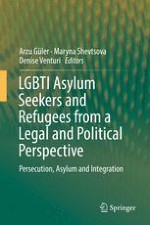2019 | OriginalPaper | Buchkapitel
5. To Stay or to Go? Decision-Making of LGBTQI Syrians in Mixed Migration Flows
verfasst von : Alex Odlum
Erschienen in: LGBTI Asylum Seekers and Refugees from a Legal and Political Perspective
Verlag: Springer International Publishing
Aktivieren Sie unsere intelligente Suche, um passende Fachinhalte oder Patente zu finden.
Wählen Sie Textabschnitte aus um mit Künstlicher Intelligenz passenden Patente zu finden. powered by
Markieren Sie Textabschnitte, um KI-gestützt weitere passende Inhalte zu finden. powered by
